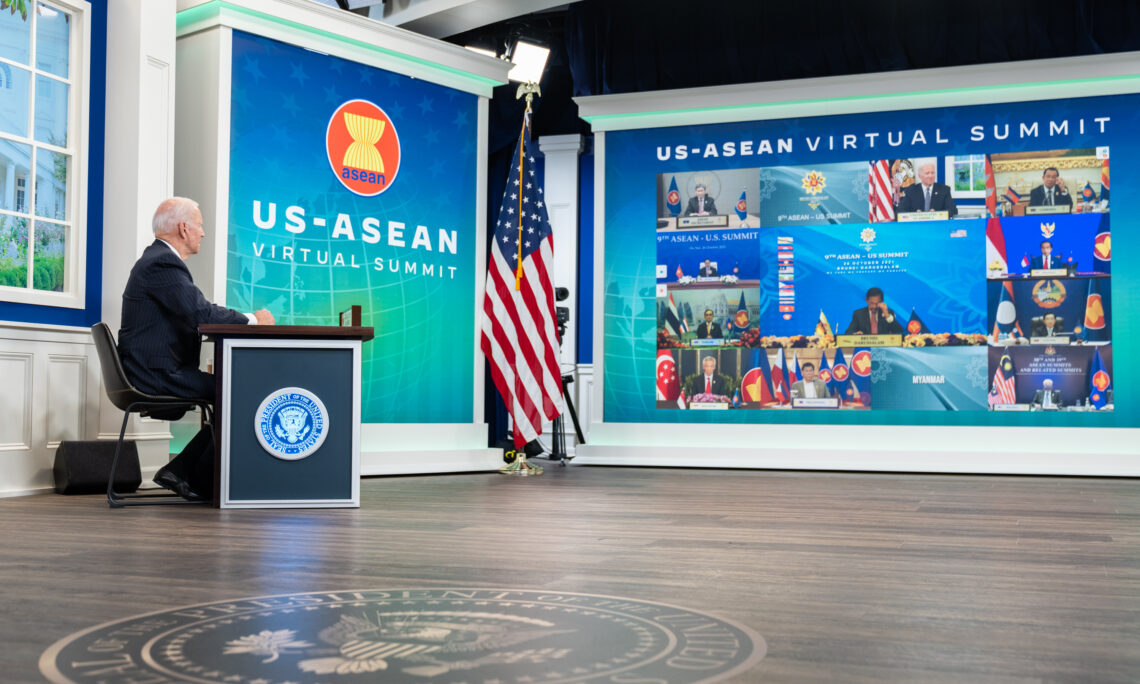By Ernest Z. Bower, President and CEO, BowerGroupAsia
The White House has invited the leaders of the Association of Southeast Asia Nations (ASEAN) for a critical summit on May 12-13. Their visit is important because Biden has one chance to convince this keystone grouping of 10 countries at the center of Asia’s economic and security architecture that he can keep the United States driving economic expansion in Asia even when a forward-leaning trade agenda is stalemated in Washington. The Ukraine conflict reminds ASEAN countries why the United States must continue to play a crucial role in building prosperity and promoting peace in Asia.
To accomplish this goal, the White House can leverage Southeast Asia’s economic potential as the world’s fifth-largest economy, Russia’s aggression in Ukraine and regional anxieties about China’s behavior and intent. American business and ASEAN’s leaders are upset that the United States pulled out of the Trans-Pacific Partnership and remain unconvinced about the viability of President Joe Biden’s new Indo-Pacific Economic Framework (IPEF), the core of his Indo-Pacific Strategy unveiled this February. This is a skepticism China is actively stoking.
Biden must narrow his focus and achieve tangible outcomes in at least three high-impact sectors. He should harvest initial wins and achieve at least one key deliverable in energy, digital and supply chains, all of which have been impacted by Russia’s invasion of Ukraine, are priorities for Southeast Asia and U.S. companies and would define success for the first-ever Summit of its kind held in Washington, D.C.
Biden appropriately has prioritized sustainability on the U.S. energy agenda, and did well to get Asian partners to up their climate ambitions at the Glasgow Climate Summit. Yet soaring energy prices and China’s backtracking on its pledge to stop building coal-fired plants overseas are important reminders that Washington’s quest for sustainability needs to be balanced with reliability and affordability that reflects the diverse challenges Southeast Asian countries face in their respective energy transitions. Focusing too narrowly on renewables will drive many ASEAN countries to resort to less expensive, emission-heavy coal-fired power espoused by China.
Biden’s team should invite the energy sector to form an Indo-Pacific coalition including companies providing different technologies, and work with that group as a stakeholder in the evolving agenda of U.S.-ASEAN ministerial dialogues covering energy, environment and climate. It must seek to significantly increase ASEAN’s renewable generation coupled with innovations in hydrogen, smart grids, carbon capture and energy storage, all areas that offer fertile ground for U.S. investment and leadership. But the agenda for these talks must also recognize the transitional role of natural gas as larger regional economies like the Philippines and Vietnam try to move away from coal. This approach is critical to help the region avoid the economy-busting energy choices Europeans are now forced to make because of Russia’s aggression.
Digital is another sector that is a U.S. strength and a top priority in Southeast Asia. With digital uptake surging 50 percent in Asia during the pandemic, economic equality, empowerment and transparency will be strengthened by enhanced cooperation. Putin’s assault on Ukraine and use of cyber as a gray-zone tactic reminds countries of the need to work together on building digital resilience.
During the upcoming summit, the Biden team should tell ASEAN leaders it intends to sign a digital economic agreement with them. The pact should leverage existing regional deals such as the Digital Economy Partnership Agreement initially inked by Singapore, New Zealand, and Chile. All ASEAN member states should be invited to join the agreement, and there should be a package of support to help countries not ready yet to prepare to sign on to it.
The third sector is supply chains. This area is a top mutual priority due to the disruptions caused by COVID-19, war in Ukraine and intensifying ASEAN anxieties about U.S.-China economic decoupling. There is a shared recognition in both Washington and in Southeast Asian capitals of the need to shift approaches to supply chain management from “just in time” to “just in case.” Dependencies that surfaced after Russia’s invasion, such as Ukraine’s role as a critical supplier of nearly half of global semiconductor grade neon and significant percentages of agricultural commodities have elevated this issue to a top priority.
The summit should initiate a new U.S.-ASEAN supply chain dialogue. The dialogue should involve the private sector from each country, define practical steps to insulate supply chains from future shocks and identify opportunities to shift production in areas like critical minerals, vaccines and electric vehicles.
Southeast Asia’s leaders say privately that they need less talk and more economic options from Washington. Unveiling new initiatives at the summit in three key sectors—energy, digital and supply chains—will be a powerful signal to business and all of Asia that the United States will remain a power player in the region. The Biden team must focus and seize this opportunity.
Ernest Z. Bower is President and CEO of BowerGroupAsia.

President & CEO
Ernie conceptualized and built BGA. His company springs directly from his understanding of the people that lead Asia’s governments, companies and key institutions and those that build and run the world’s leading companies. His career has focused on helping promote prosperity and security by finding ways to align the needs and aspirations of people, communities and institutions in Asia and the goals, capabilities and potential of the world’s top companies. A rugby player who grew up in northeastern Pennsylvania, his approach is direct, humble and personal. He is a builder and a listener. Not surprisingly, the company he built reflects ...
Read More

























